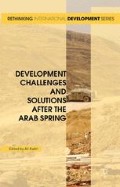Abstract
The political and social uprisings that spread rapidly across the AW in early 2011 surprised many economists. At the end of 2010, Arab countries were seen as having ‘weathered’ the global financial crisis of 2008/2009 and having regained stability. Visible impacts of the global financial crisis in the Arab region were seen in Kuwait (the Gulf Bank of Kuwait suffered a bank run in October 2008) and the UAE (the capital flight and liquidity squeeze which culminated as the ‘Dubai Shock’ of December 2009). The main adverse impact of the global financial crisis over the region was a plunge in crude oil prices, which hit growth rates of GCC countries and weakened wealth spillovers from major energy-exporting countries in the region to other Arab countries. Nevertheless, during the period before the Arab Spring, the economy of net energy-importing countries in the region, which were seen as more vulnerable to negative external shocks, stayed stable without balance-of-payments concerns. IMF country papers on Arab countries in 2010, based on IMF’s Article IV consultations put forward an optimistic view, albeit cautiously, of the economic prospects for Arab countries in 2011. In summation, in the period immediately before the Arab Spring of 2011, Arab countries were believed to be on stable macroeconomic paths.
Access this chapter
Tax calculation will be finalised at checkout
Purchases are for personal use only
Preview
Unable to display preview. Download preview PDF.
References
Abul Basher, S. and Elsamadisy, E.M. (2012) ‘Country Heterogeneity and Long-Run Determinants of Inflation in the Gulf Arab States’, OPEC Energy Review, 36(2), pp. 170–203.
Central Bank of Egypt “Egypt’s Monetary Policy Framework: ‘What is the CBE Monetary Policy Objective?’ ” Available at http://www.cbe.org.eg/English/Monetary+Policy/What+is+Monetary+Policy/General+Definition/(accessed 15 June 2015).
Charfi, F.M. (2013) ‘Capital Flows, Real Exchange Rates, and Capital Controls: What is the Scope of Liberalisation for Tunisia?’, Panoeconomicus, 4, pp. 115–140.
Cœuré, B. (2012) What Can Monetary Policy Do About Inequality?. European Parliament, October, 2012
Coibion, O., Yuriy G., Lorenz K., and John S. (2012) Innocent Bystanders? Monetary Policy and Inequality in the U.S. NBER Working Paper 18170, Cambridge MA.
DIFC (Dubai International Financial Centre) (2009) Inflation in the GCC: An Analysis of the Causes and Implications for Monetary Policy. DIFC Economic Note No. 5. Dubai: DIFC.
Friedman, M. (1968) ‘The Role of Monetary Policy’, American Economic Review, 58(1), pp. 1–17.
Gray, S., Philippe K., Vilada M. and Michel S. (2013) Monetary Issues in the Middle East and North Africa Region: A Policy Implementation Handbook for Central Bankers. Washington, DC: International Monetary Fund.
Keynes, J.M. (1936/2008) The General Theory of Employment, Interest and Money. San Diego, CA: BN Publishing.
Khandelwal, P. and Roitman, A. (2013) The Economics of Political Transitions: Implications for the Arab Spring. IMF Working Paper 13/69, Washington DC.
Mishkin, F.S. (1999) International Experiences with Different Monetary Policy Regimes NBER Working Paper 7044, Cambridge, MA.
Nsouli, Saleh M. and Rached, M. (1998) Capital Account Liberalisation in the Southern Mediterranean Region. IMF Paper on Policy Analysis and Assessment.
Romer, C.D. and Romer, D.H. (1998) Monetary Policy and the Well-Being of the Poor. NBER Working Paper 6793, Cambridge MA.
Selim, H. (2012) Exploring the Role of the Exchange Rate in Monetary Policy in Egypt ERF Working Paper 733, Cairo.
UNDP (United Nations Development Programme) (2002) Arab Human Development Report 2002. New York: United Nations.
UN-ESCWA (United Nations Economic and Social Commission for Western Asia) (2011) Inflation Dynamics in the ESCWA Region: A Vector Autoregressive Analysis (ESCWA/EDGD/2011/Technical paper.4). Beirut: United Nations.
UN-ESCWA (United Nations Economic and Social Commission for Western Asia) (2013) The Arab Millennium Development Goal Report: Facing Challenges and Looking Beyond 2015 (E/ESCWA/EDGD/2013/1). New York: United Nations.
World Bank (2004) Unlocking the Employment Potential in the Middle East and North Africa: Toward a New Social Contract. Washington, DC: World Bank.
Editor information
Editors and Affiliations
Copyright information
© 2016 Yasuhisa Yamamoto
About this chapter
Cite this chapter
Yamamoto, Y. (2016). Monetary Regimes and Socioeconomic Stability: A Missing Link in the ‘Arab Spring’?. In: Kadri, A. (eds) Development Challenges and Solutions after the Arab Spring. Rethinking International Development Series. Palgrave Macmillan, London. https://doi.org/10.1057/9781137541406_6
Download citation
DOI: https://doi.org/10.1057/9781137541406_6
Publisher Name: Palgrave Macmillan, London
Print ISBN: 978-1-349-55835-3
Online ISBN: 978-1-137-54140-6
eBook Packages: Political Science and International StudiesPolitical Science and International Studies (R0)

